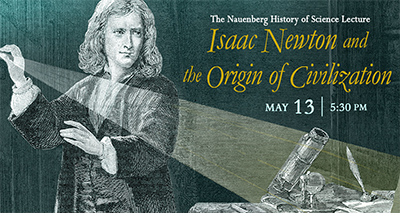Campus News
The Newton you don’t know
Caltech professor Jed Buchwald will lecture on Isaac Newton’s attempt to change the history of civilization at inaugural Nauenberg Lecture on May 13

Isaac Newton is renowned for renovating the foundations of mathematics, optics, and mechanics in the 17th century.
What you may not know is that the famed British mathematician also aimed to overturn the history of civilization, had views that amounted to religious heresy during his lifetime, and never got bonked on the head by that convenient but apocryphal apple.
History Professor Jed Z. Buchwald of the California Institute of Technology (Caltech) will present these fascinating but lesser-known aspects of Newton at the inaugural Nauenberg History of Science Lecture at 5:30 p.m., May 13 in an online event. Registration is availabe online for this free event.
The Nauenberg History of Science Lecture was established to honor Michael Nauenberg, a founding Physics Department faculty member who came to UCSC in 1966, only a year after the campus opened to students.
During his distinguished academic career, he contributed to a broad range of fields, including particle physics, condensed matter physics, astrophysics, chaos theory, fluid dynamics, and the history of physics in the 17th and 18th centuries.
Nauenberg believed in the importance of interdisciplinary scholarship connecting sciences with the humanities. After retiring in 1994, he pursued his interests in the history of science, writing books and articles about Joseph Banks, Robert Hooke, Christiaan Huygens, and Isaac Newton.
In 2013, he became the only scientist to receive the University of California Panunzio Distinguished Emeriti Award, an honor normally given to professors in the humanities and social sciences.
When Professor Nauenberg died in 2019, the UCSC Emeriti Association and the Nauenberg family established a History of Science Lecture series in the spirit of his 1999 proposal.
Nauenberg’s daughter, Saskia Nauenberg Dunkell, fondly remembered his penchant for brainstorming.
“He was always brimming with ideas and notorious for scribbling thoughts on napkins or random pieces of paper,” said Nauenberg Dunkell, Research Program Manager at The Humanities Institute at UCSC. “If you asked him a question about how the world worked, he would set up an experiment to show you the way it happened and teach you how to figure out the answer.
“For his history of science research, my dad sought out original writings and drawings preserved in special collections all over the world,” she continued. “He taught himself Latin in order to read some of these old manuscripts and exchanged ideas with many history of science scholars, including Jed Buchwald.”
Buchwald will delve into aspects of Newton’s life that will surprise non-experts, including his attempts to amend history.
“In the latter course of his career, Newton paid a good deal of attention to the way in which human civilization evolved since the [Biblical] flood occurred,” Buchwald said.
In the days of Newton, it was broadly accepted that the universe had been created roughly 6,000 years before, following the timeline established in the Bible, Buchwald said.
Though he accepted the idea of the flood, Newton rejected many other aspects of Biblical thought, including Christ’s divinity and the concept of the Trinity.
“He thought that Christ was a human who had certain—shall we say—divinely inspired powers but did not believe he rose from the dead because he did not believe in the Trinity. That could get you into a lot of trouble in those days,” Buchwald said.
Newton got away with such views because he wrote them down in his journals, and though he confided in some of his peers, he did not go around trumpeting such ideas to the general public.
Newton believed in the teachings of the Bible, but he dissented from fundamentalist views.
“By today’s standards, Newton was quite a deeply religious man who cast a gimlet eye on the claims of the Old and New Testament,” Buchwald said. “He did not like miracles very much, at least not after Creation, and he did not believe that Methuselah lived for 900 years.
“Conversely, he had to play around with the chronology of human civilization in order to make it conform to what he thought would be normal human lifespans,” Buchwald added.
That goal was one of the reasons behind Newton’s Chronology of Ancient Kingdoms Amended, published in 1728, a year after Newton’s death. In this book, he amended the generally accepted timeline for ancient civilizations, contracting Greek history by 500 years and Egypt’s by 1,000 years.
By the way, the one fact that most people believe they know about Newton—that he devised laws of universal gravitation after being bonked in the head by an apple—never took place.
Buchwald said the anecdote compresses decades of Newton’s slowly developing thoughts about mechanics and planetary motion.
“The apple incident did not happen, and as a colleague of mine in England said, the role of fruit in the history of science has been greatly exaggerated,” Buchwald said.
The Nauenberg History of Science Lecture is presented by the UCSC Emeriti Association and co-sponsored by The Humanities Institute. Register here for the lecture. Those who wish to support this lecture series can contribute here.